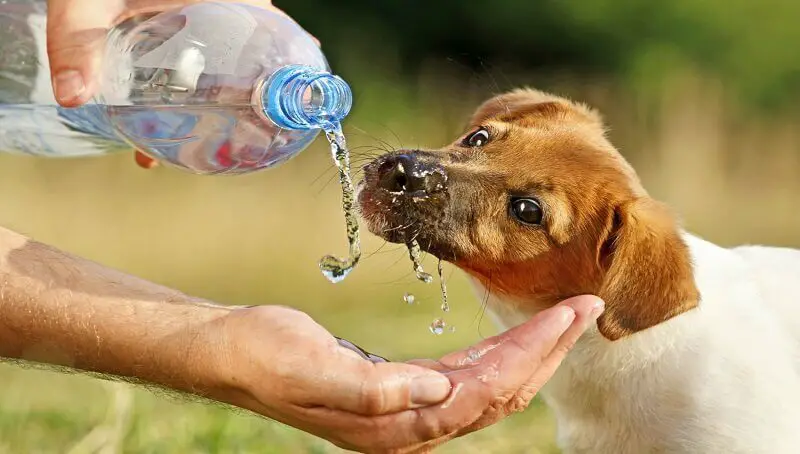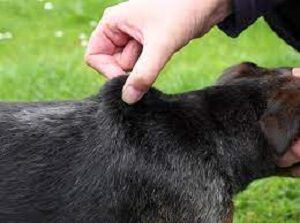
Interesting facts About Munchkin Cats
January 3, 2023
What Do Pet Snakes Eat?
January 5, 2023
Dehydration is a water deficiency in the body. Your dog loses water every day during urination and exhalation, and by evaporating saliva during panting. Dehydration in puppies can quickly become a serious problem and in this article, I will tell you the causes of dehydration, its symptoms, and treatment, to help you have a happy, healthy, and hydrated puppy.
Puppies are particularly susceptible to dehydration because they have a much lower body mass than adult dogs. In the hot summer months, overheating during play can predispose the puppy to excessive water loss. It becomes even more important to keep an eye on him in warm weather to prevent dehydration.
Much of a dog’s water loss is due to urination. Fluids are replaced when the puppy eats and drinks. Make sure that plenty of clean water is available to prevent dehydration. Puppies drink more fluids in warm weather, but in winter you also need to be sure that the water vessel does not freeze. Anything that increases fluid loss, such as diarrhea, can also lead to dehydration.
What causes dehydration?
You might also like my articles about whether:
- Why hasn’t my dog urinated for over 12 hours
- Reasons why dog’s urine smells like ammonia
- Why does my dog refuse to drink water
Dehydration can occur as a result of any disease that causes diarrhea or vomiting. Excessive urination, common in diabetes and kidney disease, bleeding, or any condition that causes reluctance to eat or drink, can also lead to dehydration.
Severe diarrhea causes dehydration by the fact that feces circulate much faster through the intestinal tract, so the body fails to absorb fluids.
Vomiting by eliminating the gastric content does not allow the ingestion of any liquid and implicitly prevents its absorption.
In the warm season, heat dehydration is the most common. Dogs hardly manage to get cold because they do not have sweat glands. Thus, in them, the body temperature regulation is done by the mouth and is accompanied by abundant salivation, which removes many fluids. If the dog does not benefit from water at its discretion, an imbalance occurs, the losses being greater than the intake.
Signs of dehydration in puppies
 The first visible sign of dehydration is dry mucous membranes, and the gums and tongue of the puppy are sticky or dry instead of wet. Saliva can also become sticky.
The first visible sign of dehydration is dry mucous membranes, and the gums and tongue of the puppy are sticky or dry instead of wet. Saliva can also become sticky.
A more obvious sign is the loss of skin elasticity. A puppy’s skin normally fits as a comfortable garment to move around, especially on his shoulders. Grasp the skin over the neck and shoulders of the pup and lift it slightly; when normally hydrated, the skin quickly returns to its place after release.
The skin retracts slowly when the dog is 7% to 8% dehydrated. A dehydration of 10% or more is serious, and the skin will remain in a ridge when released and will not return to its place.
Capillary refill time (CRT) is also a good measure of hydration check. This is the time it takes for blood to return to the mucous membranes after pressure is applied and can be demonstrated by gently pressing a finger on the pup’s gums. This briefly blocks blood flow, so the tissue turns white when the pressure is released quickly.
When the hydration of the puppies is normal, it takes less than two seconds for the white to return to the normal pink pigment. A dehydration of seven to eight percent will delay the capillary refill time for two to three seconds.
More than four or five seconds indicates severe dehydration, a very dangerous situation. These dogs also exhibit sunken eyeballs, involuntary muscle contractions, and cold extremities.
How to treat dehydration in puppies
Puppies suffering from moderate to severe dehydration need immediate medical attention to survive. Fluid therapy will be needed to rehydrate the puppy and bring his electrolyte/mineral, balance to normal.
Depending on your puppy’s needs, your veterinarian can show you how to administer fluid therapy at home, demonstrating the administration of subcutaneous fluid, meaning under the skin.
In mild cases where vomiting is not a problem, it will be useful to get the dog to drink water. Your veterinarian may prescribe products similar to those for children, which also provide lost electrolytes.
If your puppy, is dehydrated but is not interested in drinking water, you can try to give him some ice. Licking ice is a good way to make him interested and be able to drink the water he needs to recover.
The main cause of dehydration will also need to be treated. Specific medications may be needed to control diarrhea and vomiting to prevent further fluid loss. Other medications, depending on the diagnosis, such as those for treating diabetes or kidney disease, may be necessary, but this is especially in older dogs.
Some genetic diseases, like kidney, cancer, and diabetes, can make some pups more prone to dehydration than others. There are also puppies that are more sensitive to certain weather conditions, such as heat, and may be more susceptible to dehydration.
If you have a puppy that is likely to become dehydrated, consult your veterinarian to determine the best action plan to help prevent such cases.
